Circumstance, Choice & Change: The Story of Gyumri and the AYF Youth Corps Program
By Alina Sookasian
We often don’t realize that as humans, we don’t always inherit the best of worlds. Born without choice, we are thrown into consciousness; into a reality we had no part in shaping. As we travel through life, our surroundings, the people in our lives and the societies in which we live all etch their imprint into our very being, shaping our lives and the people we are to become.
Some are born into security and prosperity with the freedom to choose. Others are slaves to circumstance the moment they enter this world. Billions around the world go on their entire lives trapped in poverty, with little choice, freedom, or opportunity – always yearning for a moment of reprieve from their world.
Such is the case everywhere.
Gyumri: A City of Circumstance
I found myself faced with this difficult truth over the summer, working among people coping with a life they would rather not be living.
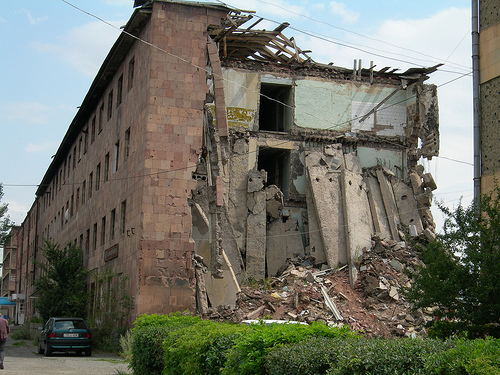 The people of the historic Armenian city of Gyumri stand victim to this circumstance.
The people of the historic Armenian city of Gyumri stand victim to this circumstance.
Gyumri, once known as Leninakan under Soviet Rule and Alexandropol under the Tsars, is Eastern Armenia’s second largest city. It was a center of industry in the 19th century and culture and art in the 20th.
But an unexpected earthquake in 1988 destroyed the city and shattered its people. In one fateful day, Gyumri was leveled to the ground, its inhabitants robbed of their homes, schools, museums, monuments and infrastructure. Families were torn apart; sons were left without fathers, and daughters were taken from their mothers. More than 25,000 innocent people died as a result of December 7, 1988 and with them died the happiness and hope of the generations that would unwillingly inherit the aftershock of this catastrophe.
We traveled to this city as volunteers from the Armenian Youth Federation to work through its Youth Corps program at a summer camp for the children of Gyumri. Our group of 11 lived here for 4 weeks, spending our days teaching and playing with nearly 200 kids escaping from their summer of boredom.
We lived with a local family in a district known as “Toorkee Mayla”, down the block from a small community of “domiks”. These aging aluminum shacks, built to be temporary housing after the earthquake, became “homes” for the past twenty years. A poignant reminder of the sad reality faced by far too many families.
Camp Gyumri Through the Lens
Camp Gyumri, however, was a different story; it was a welcomed sanctuary from the gloomy day-to-day life in Armenia’s second largest city. To paint you a picture, it’s necessary to go back to the beginning—Session 1, Day 1.
We started the first day of camp on Tuesday, July 20 at 10:30 A.M. We were all very nervous that day, especially as we welcomed the 75 children to the public school we were using as our day-camp.
“It wasn’t even 10:30 when we got to the school and they were all already lined up, and so full of energy and excitement,” recalls participant Kareen Sassounian. We were all excited and worried at the same time.
“It was very intimidating counting one kid after another as they filled into the classroom we were in,” she continues. “It seemed very daunting at the time. How were we going to do this for four weeks, with just three counselors for every thirty five kids?”
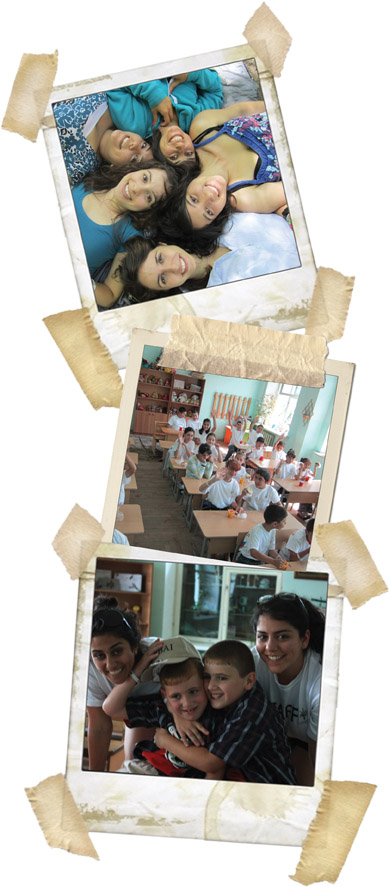 “Deer in the headlights” is the most apropos expression to describe our general reaction to the kids that day. Thankfully, the rest of the day went by rather rapidly after the initial introductions and presentation of camp rules. After about an hour, we divided the children into color groups of red, blue, and orange and then into beginner, intermediate and advanced English classes based on their comprehension of the language.
“Deer in the headlights” is the most apropos expression to describe our general reaction to the kids that day. Thankfully, the rest of the day went by rather rapidly after the initial introductions and presentation of camp rules. After about an hour, we divided the children into color groups of red, blue, and orange and then into beginner, intermediate and advanced English classes based on their comprehension of the language.
Once everything was sorted out, we played what felt like a never-ending game of butt volleyball—an AYF Camp favorite that involves two teams playing volleyball while sitting on the floor. We ended that day by lining up in our color groups and singing Mshak Banvor, the anthem of the Armenian Revolutionary Federation. Interestingly enough, many of the kids who were alumni from Camp Gyumri 09, not only remembered the song, but sang it with pride.
Every day after the first was a bit better, with the daily agenda running smoother and more efficiently. Our personal relationships with the campers also solidified and in less than a few days we had already become full time mentors and older siblings for our campers, who had already come to see Camp Gyumri as their home away from home.
A Day in the Life
Picture this: A typical day at camp began with the 11 of us counselors scrambling out of bed, pouring tea down our throats, grabbing “bonchiks” from the nearest baker, and darting across town to beat the kids to camp only to see the bittersweet picture of them already there, playing in the yard.
“No matter how early we woke up or arrived there, they were always a step ahead of us,” says Daniel Ohanian, a volunteer joining our team from Toronto Canada. “It was like an ongoing battle of failed attempts trying to beat them to the school.”
Once at camp, we would quickly scramble to set up our classrooms then rush outside to line up the campers to sing the Armenian national anthem. What followed after that could only be described as brief moments of mayhem and havoc, as the kids, all at once, tried to squeeze through a small doorway to get to their respective classrooms to devour their breakfast.
After breakfast, the campers would split up into their English classes for an hour. The beginner level classes focused on teaching the ABC’s and how to read and write basic words; the intermediate classes built vocabulary and sentence structure; while the advanced section introduced conversational skills and proper grammar.
“Most of the kids seemed to really enjoy learning English and were constantly leaping out of their seats to answer a question or for a chance to write on the chalk board,” recalls volunteer Kristina Karayan.
At the hour’s end, the kids would impatiently run back into their color group classrooms, eager to find out about the day’s next activity. The general list of color group activities included: drawing, painting, and making necklaces, bracelets, key-chains, and other handcrafts with beads and lanyards.
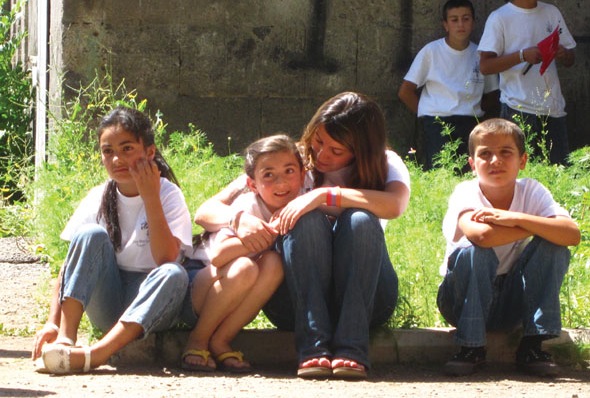 Complimenting our schedule were weekly educationals about personal hygiene, nutrition, the dangers of smoking, and the environment. Professionals from environmental organizations such as the Armenian Tree Project and Sunchild visited Camp Gyumri throughout the program to teach the campers about a wide range of issues, from Gyumri’s trash and pollution problems, to the deforestation of the country and the fundamental importance of trees to their personal lives.
Complimenting our schedule were weekly educationals about personal hygiene, nutrition, the dangers of smoking, and the environment. Professionals from environmental organizations such as the Armenian Tree Project and Sunchild visited Camp Gyumri throughout the program to teach the campers about a wide range of issues, from Gyumri’s trash and pollution problems, to the deforestation of the country and the fundamental importance of trees to their personal lives.
Singing was also a big part of the curriculum. For an hour each day, campers studied and practiced Armenian national and patriotic songs in preparation for the end-of-session song competition between the color groups. Interestingly enough, the majority of the traditional songs, commonly known throughout the Diaspora, were relatively unheard of here in Gyumri.
For camper Lusine Safarian, song practice was the best part of camp. “I really want to be a singer when I grow up but I can’t afford singing lessons,” she says. “Song practice was my favorite part of camp because it was my first real chance to practice singing in a setting other than just by myself.”
One activity that everyone equally anticipated from the moment the day started was the two hours of sports and games at the end of each camp-day. Lunch seemed almost like a roadblock to sports for many of them, especially Hrach Maloyan, who thought of nothing but sports all day long. “Game time is my favorite part of camp because of the teamwork factor,” he says. “I love being able to work toward something with my friends and the reward is so much greater when you win!”
“Sports and games were very important, especially since a majority of the kids came from families that couldn’t afford to buy balls for them to play with over the summer,” explains red group counselor Rita Yemenidjian. “It was also a chance for us to connect with the campers and give them an amazing and active summer.”
Talent shows, games, singing, and “dance parties” were all big hits among the campers, recalls Marae Sarkuni, a blue group counselor. “We would initially prepare a list of activities ahead of time, but we realized the kids really appreciated, and loved, it when we put music on and just let them be.”
Little Big Things
All these kids wanted was some freedom and attention—a chance to just sing, dance, and show off their karate or gymnastic skills. It was during these moments, when the kids were doing what made them happy, that we grew the most attached to them.
 “Little Robert loved making necklaces with beads so much that he would stay in from sports time to work on them,” explains Marae. “By the time he made six of them, he was walking all around camp, showing them off and simply enjoying his works of art, his pride and joy.”
“Little Robert loved making necklaces with beads so much that he would stay in from sports time to work on them,” explains Marae. “By the time he made six of them, he was walking all around camp, showing them off and simply enjoying his works of art, his pride and joy.”
“One day, when he came to show them to me, I expressed my admiration for them and told him how pretty they were,” she continues. “At that second, he took one off and handed it to me and said, ‘Ungerouhi Marae, just for you.’”
Robert’s case was not unique. The majority of the nearly 200 campers forged close bonds with the Youth Corps volunteers. That’s because children in Gyumri don’t generally get the love and attention they need, according to the local ARF’s Badanegan fieldworker, Ara Nakhshkaryan. Unger Ara, as we came to know him, works as a grade-school teacher in one of nearly a dozen schools spread throughout the city. For him, the very fact that people were spending time with these kids was reason enough for Youth Corps to exist.
“Teachers here don’t have the time and resources to follow up with every child’s specific needs,” he says. “Here, children, who throughout the year don’t get any attention from anyone, feel significant and each relationship with a counselor has a very strong impact on their lives.”
“The smallest things can have the largest impact in places like Gyumri, where children don’t have access to basic things like a pencil and paper or even a toothbrush. Here, the things we take for granted are cherished beyond imagination,” says participant Nora Kayserian, who had arrived in Gyumri a month earlier to volunteer for the Gyumri Social Services Center through BirthRight Armenia.
The Choices we Make
An amazing thing happened this summer in this city of misfortune, where few from the Armenian Diaspora ever venture.
Here, a group of young Armenians, living 7000 miles away from their homeland, made a difference in the lives of 180 children. I don’t think any of us will ever forget even a single minute of those four weeks at Camp Gyumri. The children will forever remember that the counselors spent extra time looking for the perfect colored crayon for them, while the counselors will forever relive the torrent of emotions caused by every single tear shed by a camper when each session came to its bitter-sweet end.
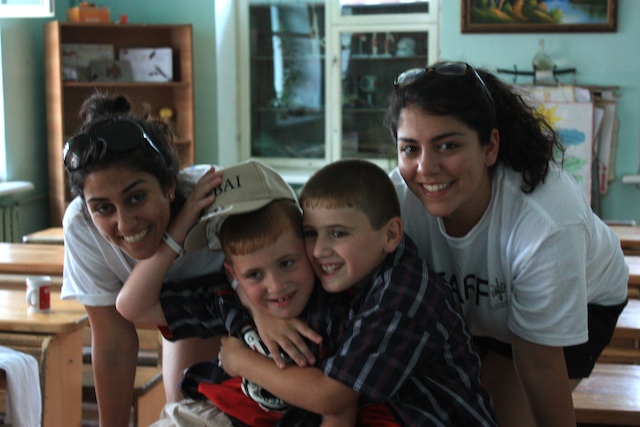 We found a home in Gyumri, and it changed our lives forever. Because at the end of this entire experience, we all realized that the kids of Camp Gyumri were not the only one’s benefiting from the Youth Corps program. Living and working in Gyumri reinforced our Armenian identity and connected us to a very powerful legacy of service to the homeland.
We found a home in Gyumri, and it changed our lives forever. Because at the end of this entire experience, we all realized that the kids of Camp Gyumri were not the only one’s benefiting from the Youth Corps program. Living and working in Gyumri reinforced our Armenian identity and connected us to a very powerful legacy of service to the homeland.
For Allen Yekikian, who served as this year’s group leader, “Youth Corps instilled in all of us the same dreams that inspired a generation of revolutionaries to struggle for a national awakening and liberation over a century ago.”
“We did real ARF work here, like the founders of the organization, who from the 19th century Diaspora set out and traveled to villages in the homeland and worked side by side with other Armenians to develop communities, build schools, and spread national awareness,” he exclaims.
“When joining the AYF and later ARF, I took an oath to work for the social, political, economic and educational betterment of my people and community and that’s exactly what Youth Corps enabled me to do this summer,” he adds.
Anyone who has ever served as a Youth Corps volunteer has probably felt something akin to what drove us all to join the program this summer.
This program is humbling. It is inspiring. And it will define you.

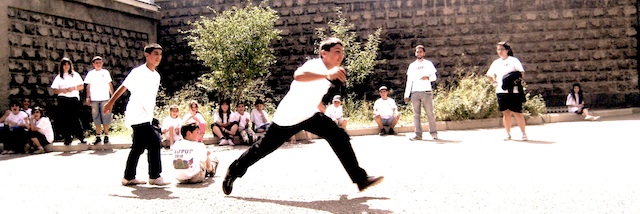
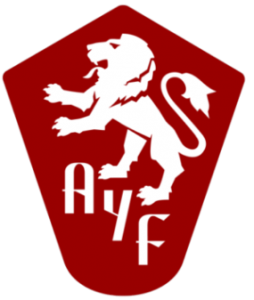
Leave a Reply
Want to join the discussion?Feel free to contribute!